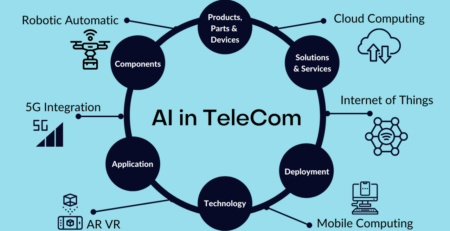AI Applications in Agriculture
AI applications in agriculture and farming are revolutionizing the industry by improving efficiency, productivity, and sustainability. Some key areas where AI is making an impact include:
- Precision Agriculture
- Data-Driven Decisions: AI-powered systems analyze data from sensors, weather stations, and satellite imagery to help farmers make informed decisions about planting, irrigation, fertilization, and pest control.
- Variable Rate Technology (VRT): AI can optimize the use of fertilizers, pesticides, and water based on the specific needs of different areas in a field, reducing waste and increasing crop yield.
- Crop Monitoring and Disease Detection
- Drones and Satellites: AI-equipped drones and satellite imagery can monitor crop health, detecting early signs of diseases, pests, and nutrient deficiencies. Machine learning models analyze the images to identify issues, allowing for timely intervention.
- Plant Disease Prediction: AI models trained on historical data and environmental factors can predict outbreaks of diseases, helping farmers take preventive measures.
- Robotics and Automation
- Autonomous Tractors and Harvesters: AI-driven machines can operate autonomously in fields, reducing the need for manual labor. For example, robotic harvesters can pick fruits or vegetables, and autonomous tractors can plant seeds or till the soil.
- Weed Control: AI-powered robots can distinguish between crops and weeds, allowing them to target weeds with precision, either by removing them manually or applying herbicides only where needed.
- Smart Irrigation Systems
- Water Efficiency: AI algorithms analyze data from soil moisture sensors, weather forecasts, and historical data to optimize irrigation schedules, ensuring that crops get the right amount of water without wastage.
- Remote Monitoring: AI systems can remotely monitor irrigation systems and adjust water usage based on real-time environmental conditions.
- Supply Chain Optimization
- Demand Forecasting: AI can predict future demand for agricultural products, allowing farmers to plan production and distribution more effectively. This helps reduce waste and ensure that crops are harvested and distributed at the right time.
- Logistics and Distribution: AI algorithms can optimize the routes for transporting produce, reducing fuel consumption, and ensuring fresh goods reach the market faster.
- Livestock Management
- Health Monitoring: AI tools such as wearable sensors for animals can monitor their health, detecting early signs of illness or distress. This helps farmers take preventative action and reduce losses.
- Behavioral Analysis: AI can analyze patterns in livestock behavior, such as eating, sleeping, and movement, to detect anomalies that might signal health issues or the need for environmental adjustments.
- Predictive Analytics
- Yield Prediction: AI uses historical weather data, soil conditions, and other factors to predict crop yields with high accuracy, helping farmers plan their harvests and manage resources more efficiently.
- Market Price Prediction: Machine learning algorithms analyze market trends and historical pricing data to help farmers predict the best time to sell their crops, maximizing profitability.
- Sustainable Farming Practices
- Soil Health Monitoring: AI-powered sensors and data analysis tools can provide insights into soil health, identifying the right mix of nutrients and advising on sustainable practices that maintain soil fertility over the long term.
- Reduction of Pesticides and Fertilizers: AI-driven precision agriculture helps minimize the use of chemicals, reducing their environmental impact and promoting sustainability.
- Climate Adaptation
- Climate Forecasting: AI models can predict the impact of climate change on agricultural practices, helping farmers prepare for extreme weather conditions, shifts in growing seasons, and other environmental changes.
- Customized Planting Plans: AI can recommend crop varieties that are best suited for future climate conditions, allowing farmers to adapt their practices accordingly.
AI in agriculture offers significant potential for improving productivity, sustainability, and profitability. However, the adoption of these technologies requires investment in infrastructure, training, and collaboration between farmers, tech companies, and policymakers.






